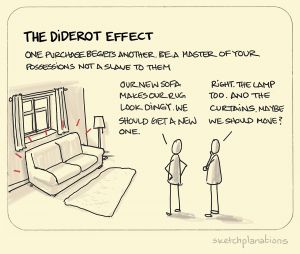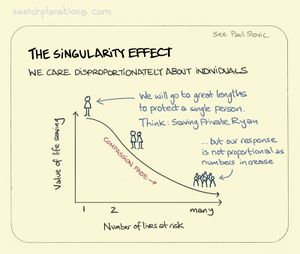Cognitive biases
A cognitive bias is a systematic error in thinking that occurs when people are processing and interpreting information in the world around them. They are predictable patterns of thought and behaviour leading to incorrect conclusions.
Cognitive biases persist in society as they are self-reinforcing by a combination of the Dunning Kruger effect and the Confirmation Bias. Below is a list of the most prevalent cognitive biases in society ranked on their importance:
- Optimism bias - a computer cannot tell you whether it will rain or not, only the probability of it occurring.
- Additive Bias - we may be biased toward adding more things—more resources, more rules, more habits and responsibilities—rather than the opposite.
- Availability Heuristic[1] - people tend to use the ease with which they can think of examples when making decisions.
- Anchoring Effect - the common human tendency to rely too heavily on the first piece of information offered (the “anchor”) when making decisions.
- Hindsight Bias - the tendency to think that an event was more obvious or predictable than it really was.
- Sunk Cost Fallacy - whereby a person is reluctant to abandon a strategy or course of action because they have invested heavily in it, even when it is clear that abandonment would be more beneficial.
- Halo Effect - people assume a person or thing is good in every way because of one good characteristic.
- Scarcity effect - makes people more likely to buy something when they think it’s about to run out or be taken away from them.
- Thought paradoxes - Allais' Paradox.
Below is a list of common psychological fallacies:
Sunk Cost
A sunk cost fallacy is when someone continues doing something because of the effort they already put in it, regardless of whether the additional costs outweigh the potential benefits. "Sunk cost" is an economic term for any past expenses that can no longer be recovered.
For example: Imagine that after watching the first six episodes of a TV show, you decide the show isn't for you. Those six episodes are your "sunk cost." A sunk cost fallacy would be deciding to finish watching anyway because you've already invested roughly six hours of your life in it.
Appeal to Pity
An appeal to pity relies on provoking your emotions to win an argument rather than factual evidence. Appealing to pity attempts to pull on an audience's heartstrings, distract them, and support their point of view.
Someone accused of a crime using a cane or walker to appear more feeble in front of a jury is one example of appeal to pity. The appearance of disability isn't an argument on the merits of the case, but it's intended to sway the jury's opinion anyway.
Bandwagon Fallacy
The bandwagon fallacy assumes something is true (or right or good) because others agree with it. In other words, the fallacy argues that if everyone thinks a certain way, then you should, too.
One problem with this kind of reasoning is that the broad acceptance of a claim or action doesn't mean that it's factually justified. People can be mistaken, confused, deceived, or even willfully irrational in their opinions, so using them to make an argument is flawed.
The Diderot Effect
Coined after the French philosopher Denis Diderot’s remarkably titled essay “Regrets on Parting with My Old Dressing Gown”.
The gist of the effect is that we generally surround ourselves with objects that fit our current sense of identity. If we get something that doesn’t fit that identity we may find ourselves replacing the rest to match the new identity.
Poor Diderot was given a fancy new dressing gown and ended up replacing most of his possessions and ultimately living in poverty, to paraphrase a little.
The singularity effect
Related to psychic numbing, the singularity effect is the name to how we care disproportionately about an individual as compared to a group. Think, Saving Private Ryan, where an enormous effort is launched to save a single soldier in the second world war. It turns out that even as you add a second person there’s some justification for something known as compassion fade. The addition of more people doesn’t increase our willingness to help proportionally — our compassion fades as more people are involved.
Personal Bias Suppression
Analyzing one's beliefs, preferences, or associations while experiencing personal bias suppression can lead to new perspectives that would take years of in depth psychoanalysis. The suppression of this innate tendency often induces the realization that certain aspects of a person's personality, world view and culture are not reflective of objective truths about reality, but are in fact subjective or even delusional opinions.[2] This realization often leads to or accompanies deep states of insight and critical introspection which can create significant alterations in a person's perspective that last anywhere from days, weeks, months, or even years after the experience itself. Personal bias suppression is one of the hallmark effects of using psychedelics.
References
- ↑ https://www.goodreads.com/book/show/11468377-thinking-fast-and-slow
- ↑ Horváth, Lajos; Szummer, Csaba; Szabo, Attila (2017). "Weak phantasy and visionary phantasy: the phenomenological significance of altered states of consciousness". Phenomenology and the Cognitive Sciences. 17 (1): 117–129. doi:10.1007/s11097-016-9497-4. ISSN 1568-7759.


